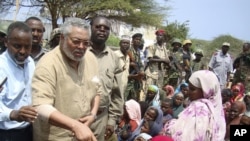An official of the African Union (AU) says there is a need for short, medium and long term approaches to resolving the drought and famine plaguing the Horn of Africa.
Tumusiime Rhoda, the Commissioner for Rural Economy and Agriculture at the African Union Commission, said an estimated $1 billion is urgently needed to help combat the ongoing famine.
“The African Union Commission will continue to provide the leadership it has been providing…to build partnerships and also to support the resource mobilization effort and coordinate with local institutions…to ensure that we develop systems [to] help feed the people of the continent. We have the potential.”
Rhoda said the AU Commission is looking at building what she calls resilience through long-term and sustainable systems.
“We believe that if we could have implementation of the countries’ investment plans…which have actually focused on strengthening water and sustainable and management … [there] will definitely be a permanent solution to this problem which has been recurring in the Horn of Africa,” said Rhoda.
Critics say the continental body has failed to be proactive in finding solutions to drought and famine, a charge Rhoda denies.
She said the AU has been taking measures to combat the problem in the long term, despite limited resources.
“We are of course looking at sources like the Global Agriculture Food Security Program, which was borne out of the L’Aquila Initiative [G8 summit economic growth agreement in 2009], but then the [promised] resource flow has not been forthcoming,” said Rhoda. “So long term solutions, we believe, are really very, very important but at the moment, people are dying. We need an emergency response quickly.”
Leaders at the G8 summit sought to globally mobilize $20 billion over three years through what was called a “coordinated, comprehensive strategy” that focused on “sustainable agriculture development.”
Rhoda called for countries within the East African Community to help resolve the problems of drought and famine.
“We need a strong institution that passes through IGAD [the Intergovernmental Authority on Development] because I believe that proper organization, leadership and a strategic approach is extremely important,” said Rhoda. “Clearly, the midterm strategy for this area is supposed to build on what countries have prioritized within the country investment plans.”
Rhoda also said the AU has planned a fundraising drive and is marshalling its resources to help with current efforts to resolve the famine.




